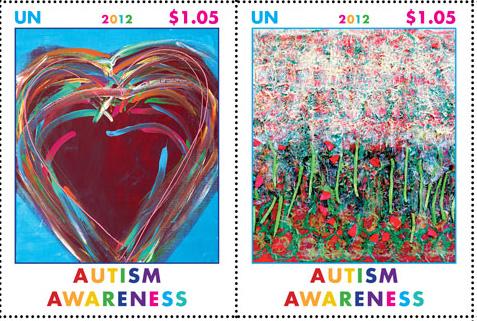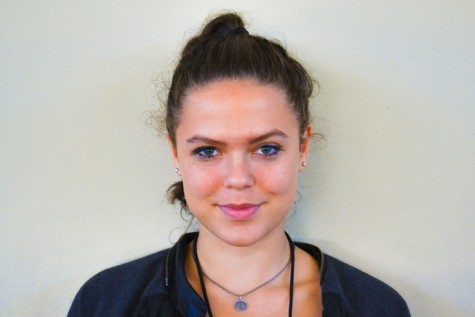What It’s Like to Be Me: Autistic in the Mainstream
An Understandable Tale of Wanting Love and Support with a Less-Understood Disorder

Autism awareness postage stamps from the UN Postal Administration, photo courtesy of the United Nations News Centre
June 22, 2015
The words filtered through slowly, emerging out of a sea of likes and hesitations.
“I don’t like telling people that I have this disorder, because I don’t want there to be an effect on their lives,” he says. “I just don’t want to pressure them by adding baggage about me.”
So were the words of Chance*, an ERHS student diagnosed with the neurodevelopmental disorder autism.
You’ve probably heard that word, “autism,” before, perhaps rattled off the tongue of a PSA-spokesperson or mentioned in the context of renowned geniuses such as Mozart or Einstein. Its deep complexity has most likely only exacerbated its mystique. Even to scientists, it is a puzzle.
Autism is an umbrella term. The disorder encompasses a variety of symptoms, ranging from high-functioning mathematical prodigies to those who can barely speak at all. Symptoms include communication difficulties, aversion to loud noises, trouble making eye contact, and in the case of Asperger’s, a type of autism, self-absorption or genius in a particular topic. All of it is blanketed as ASDs, autism spectrum disorders.
“Autism is a neurodevelopmental disorder that results in impairments in social interaction and communication as well as the presence of stereotyped or repetitive behaviors,” explained Catherine Stoodley**, assistant professor of psychology and director of the developmental neuroscience lab at American University. “While no one knows what causes autism, there are many theories and it is an active area of research.”
Of course, different cases are, well, different. For Chance, he said that sometimes communication does bother him, but sometimes it doesn’t. “I don’t know if they’ll ignore me later on, or make a negative comment about me,” Chance said on one of the reasons why communication is difficult with his peers.
In response to Chance’s aversion to loud noises, he stays in a teacher’s classroom during his lunch period to avoid the ruckus of the cafeteria.
Interview progress was slow. He has difficulty channeling his thoughts into fluid speech, a product of his autism. However, through a series of person-to-person and email interviews, an image starts to emerge, and it becomes clear that the thoughts and emotions hiding under his communication difficulties are just as felt, just as raw, and just as real, as anyone else’s.
“I just want other people to get to know me,” Chance said. “I wanted to be loved and supported by my peers and for the truth, to find love from someone,” Chance wrote in an email.
For Chance, he said that bullying has not been a problem. In that way Chance is lucky; a report by the Interactive Autism Network detailing preliminary findings about autism and bullying found that nearly two-thirds of children ages 6 to 15 have been bullied, according to their parents.
Yet, he described feeling ostracized from his peers. He said that he is afraid that other students will think he is “nuts,” and that they will “think there’s something wrong with” him.
Like other high schoolers, Chance said he is thinking about college. He plans on majoring in engineering. “Mostly I’m good at math,” he said, although he also admitted that he’s trying to get better at it. Right now, he favors one of his classes (the specific class won’t be named to reduce the chance of his identification), where the teacher gives the plans and a syllabus ahead of time, because it helps Chance to plan things out. His foreign language class is a larger stressor for him. He said that he doesn’t “know if [he] can say the right things or not,” and then when you add the dimension of foreign language, it becomes exceedingly difficult.
And also like other high schoolers, he mentioned that his family and parents insert complications into his life. “Sometimes when dealing with family, it makes me lose course in my work,” he said. His parents tell him that he needs to focus in on one thing, he explained, which makes him feel scared and confused. He said that he has to deal “with all the craziness around him.”
Through all of this, he carries a degree of pessimism about his condition. “For the people that don’t have autism,” he wrote, “their lives are set and memorable unlike mine, and they have everything they desired.”
You might have noticed some odd verb cases in Chance’s quotes, such as the recent use of the word “desired.” No, this is not a typo, rather a part of his autism.
“Many individuals with autism have problems with language,” Stoodley explained. “In fact, delay in language development is one of the diagnostic criteria for autism. While no one knows what causes this, people believe it is not simply the result of improper or limited use/interactions but rather based in something that is happening in the brain.”
Such language difficulties are not limited to incorrect grammar. Perhaps you remember the scene in the recent movie The Imitation Game, where computer genius Alan Turing (played by Benedict Cumberbatch) does not understand the subliminal social signals of his colleagues, like certain jokes and flirting. That was an attempt to portray that he was on the autism spectrum.
“Language difficulties can range from the aforementioned delay in the onset of speech to difficulties with understanding much more complex aspects of language, such as sarcasm,” Stoodley said.
The language difficulties, trouble with noises, ostracism from his peer group, all might seem sad. Many people propagate the stereotype that that autistics can’t make friends, or that they can’t fit in. However, such a perspective might be more subjective.
What says that autism has to be a disorder? What says that Chance, and all of the other children in the US (the CDC estimates it’s 1 in 68 children) are so peculiar? What says that they are the ones with the disorder, and not the non-autistics? Why is autism labeled as a disorder, when it could just rather be another mode of brain functionality?
As some in the scientific and autistic communities are finding, autism is just another mode of thought. The June 3 TIME article “What if People With Autism are Actually Hyperfunctional?” addressed the idea that “the autistic brain may actually be more super-wired to detect and absorb cues from the outside world,” explaining a recently published study that “suggests that the brains of people with autism are actually hyperfunctional rather than stunted or impaired.”
Similarly, there are movements towards the rights of autistic persons and autism acceptance. The nonprofit Autistic Self Advocacy Network explains on their website, that one of their goals is to gain “social acceptance of neurological difference as part of the broad landscape of human diversity and [seek] to bring about a world in which Autistic people enjoy the same access, rights, and opportunities as all other citizens.”
“Most “disorders” are associated with both advantages and disadvantages,” Stoodley wrote. “While some people regard autism as a disorder, there are many people with autism who find their autism makes them special or better able to do certain things. (That said, it is important to note that savant abilities are not the norm in autistic individuals.) The scientific community is actively investigating causes of autism in order to better understand what is happening at a neurological level, and investigating potential causes. There are differences in the structure and function of the brain in autism, but there are also differences in brain structure and function in people who are bilingual and musicians. Whether individuals feel that it is a disorder or not is an area of debate! There is no right answer, and it will depend on the individual you are speaking to.”
And so what if Chance was me, interviewing him? What questions would he ask?
What are the major reasons I have this disorder, why can’t I just get rid of it, and why don’t people talk to me, are his answers.
*A pseudonym was used in this story to protect the identity of the individual who chose to tell his story.
**Anila D’Mello contributed to some of the responses of Catherine Stoodley.



